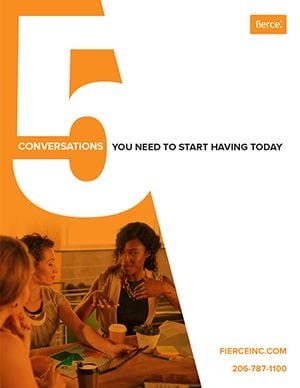
Have you ever had one of those negative “suddenly” moments in your career? A time when you thought you were headed toward one result and instead, you ran head on into something you weren’t expecting?
When I think of these moments, the image I see in my brain is that of the Wile E. Coyote.Yes, the Loony Toons character. That darn Coyote is so caught up in what he is chasing (The Roadrunner) that he fails to recognize the brick wall (or enormous cliff, or stick of dynamite) that is destined to stop him dead in his tracks.
His failure only takes seconds to play out and “suddenly” he is flat on the ground, or falling through the air with that look of bewilderment and dread on his face that screams, “What just happened?”
I vividly remember a time when I suddenly found myself asking the same question.
I was poised to move into a new role. I wanted this role so badly I could taste it, and I was sure it had my name written all over it. I had worked my tail off and I was speeding toward that promotion — it was mine.
When it came time to announce the position, the proverbial brick wall made its appearance, and I ran head-on into it at breakneck speed: the role didn’t go to me, it went to someone else. (Cue the cartoon crash sounds and the look of shock and awe) “What just happened?”
A trusted mentor gave me some advice at that time, and told me to reach out to the hiring manager and have a conversation. “Ask her for feedback,” she said. She wanted me to ask her why I didn’t get the role.
Honestly, I didn’t know if I wanted to do that. It would only make matters worse, I told myself. What if she told me I wasn’t smart enough, or I didn’t have what it takes and never would? I didn’t want to hear that. Maybe I could skip the feedback, just work harder, and get the role the next time around.
For 48 hours, I tortured myself. Do I ask, don’t I ask? I was afraid of what I might hear.
Have you ever been afraid to have a feedback conversation? Really think about that for a moment. Did you ever miss an opportunity to give or get feedback from someone because you were too scared about what they might say or how they might react?
According to research, you and I are not alone in our fear. In fact, it is often fear or uncertainty in some form that prevents us from giving feedback or seeking feedback in the first place. Did you know that 1 in every 10 people has a significant fear of feedback?
Those of us who have even a little trepidation around feedback usually fear the failed conversation. We fear being judged or misjudged, not being liked by others, or we have a generalized fear stemming from a past conversation that went poorly.
And while so many of us are afraid of the failed conversation, it’s actually the missing conversations that can be the most costly.
Think back to that feedback conversation you didn’t have. What did that avoidance cost you? What did it cost your team, your organization?
When we aren’t willing to give and receive feedback with others and instead, we convince ourselves that the conversation will cost us more than what we could gain from it. We are building that brick wall that will eventually stop us from achieving the results we want.
We are no smarter than that darn Coyote.
Interestingly, on the flip side of this common fear of feedback, there is a dichotomous need emerging in the workplace. A need for more of it. According to PwC, nearly 60% of employees surveyed stated that they would like feedback on a daily or weekly basis — a number that increased to 72% for employees under age 30.
So while many of us have some fear of feedback, there’s a call for more consistent, authentic, in-the-moment feedback that can’t be ignored.
3 Tips to Master Feedback
Knowing the high majority of us has an undeniable need for feedback, let’s make sure we are on the same page with what that means. What exactly is FEEDBACK?
If you look at the word itself, in its simplest form feedback is made of two parts, feed and back. Or as I like to say, “feed it back.” Show me what it is I am failing to see. Hold up the mirror for me so I can see myself from a different perspective. Help me see what you see.
Feedback is a way to remove the blind spots from our life so we can reach our desired suddenly…not the undesirable ones. It helps us get where we want to go.
Think of it in terms of driving a car. Blind spots can be dangerous, if not deadly, would you agree? When we can’t see what is coming at us, or we are blind to what might be in our way, we risk serious injury to ourselves and others.
At the very least, we risk not getting to where we want or need to go. Feedback is course correction — feeding back the information we are missing, or that we are blind to, guiding us to safely reach our goal.
So, what could your world look like if you pushed past the fear and trepidation and embraced more feedback? How can you MASTER THE COURAGE to invite more of that “feed” back into your life and help others to do the same?
Here are some steps you can take (and encourage for others) to make frequent feedback conversations a norm in your workplace:
Step 1: Check your context.
Research shows there is a great deal of power in positivity — positive thinking literally makes your brain work better.
If you are worried about the outcome of a feedback conversation, take a cue from the experts: instead of focusing on all the things that could go wrong in the conversation, make a list of what the benefits could be if this conversation goes WELL. Go into the conversation with the knowledge that the benefits outweigh the risks.
Specifically…
When asking for Feedback reflect on how you will be made better just by hearing this person’s perspective. How will this help you achieve your desired results or improve and grow?
If you are giving feedback, first consider how this feedback will be in service of the person you are giving it to – how will this help them?
By focusing on what you or others have to gain, you are not only more likely to want to have the conversation, but your brain will be more open to receiving the message more fully in the moment.
And if that isn’t enough, get this: it’s also shown that people who practice positive thinking tend to live healthier lifestyles — they get more physical activity, follow a healthier diet, and don’t smoke or drink alcohol in excess.
Having a positive outlook enables you to cope better with stressful situations, which reduces the harmful health effects of stress on your body. Bonus!
Step 2: Be prepared to listen and learn.
Why is receiving feedback one of the harder things to do? Because it requires you to be vulnerable. To stay open to where you aren’t doing things well, can feel like you’re standing on the cliff of failure. And their words may just push you off. It feels risky.
We take feedback personally because it IS personal. When we are given feedback, we were not expecting or may even be embarrassing for us, our ego can prevent us from hearing the feedback or doing something with it in order to make changes
So before entering any feedback conversation, make a commitment to yourself to really listen to what the other person is saying.
Receiving feedback doesn’t mean you have to believe every bit of the feedback you receive. Instead, receiving feedback means you enter into the conversation and explore the feedback TOGETHER.
So, listen to the specifics in the feedback. What is the giver trying to convey? Let them finish their thoughts and work not to get defensive. Ask yourself: What would happen if I suspended my perception of myself and stayed fiercely present with someone else’s perception? What could I learn?
Step 3: Say “thank you.”
Greater respect often leads to great results. If you are asking for feedback, look at it this way, by providing you with powerful feedback, the giver is actually taking a partnership role in your success. They are helping you succeed!
Thinking of feedback this way can remove some of that initial fear — knowing this person is being of service to YOU. And yes, providing feedback can feel like a dangerous and risky thing.
Recognize how difficult it is for anyone who is willing to give you feedback and thank them for having the courage to share it.
On a broader note, research actually shows how a culture of gratitude/appreciation leads to happier, more productive, and more helpful employees:
Francesca Gino, Professor at Harvard, talks about a phenomenon called the “gratitude effect”. Research done by Gino shows receiving expressions of gratitude makes us feel a heightened sense of self-worth, and THAT in turn triggers other helpful behaviors toward both the person we are helping and other people too.
Bottom line? Giving thanks can actually contribute to a richer, healthier feedback and service-oriented culture. People helping people.
Think about who deserves your gratitude for feedback they shared with you recently. Be sure to say “thank you.”
Finally, it is important to remember, mistakes are a part of the process
I like to remind people that as humans, we are naturally and wonderfully imperfect, and there will be times when your feedback conversations don’t go well. When that happens, it is helpful to practice the following:
Take responsibility for your own emotional wake. If you have unintentionally hurt someone, or misjudged a situation, apologize. There is nothing more powerful in this world than someone saying (and meaning) “I’m sorry.”
Be patient with yourself and others. Consistency doesn’t happen in a day, the feedback muscle takes time to build. That’s the nature of change. Be aware that overcoming fear and creating a culture of ongoing feedback is going to take time.
At the end of the day, it is feedback that serves as our navigator, getting us where we want and need to be. So ask yourself, “If there is something I can learn about how I can be more effective why wouldn’t I want to know? If there is something I can share with others to make them more effective, why would I withhold it?”
Giving and getting feedback and refining what is working and not working is critical for growth and success. Go into the conversation with courage, and be prepared to truly listen and learn.
By the way, I did finally muster up the courage to ask that hiring manager for her feedback. “You are lacking a leadership voice” was the message. I had the skill, I had the work ethic. What I was missing was something I had never considered, my own leadership presence.
Yes, it was hard to hear, and yes, my palms were sweating and my heart was racing the entire time. AND…it was one of the most valuable conversations I’ve ever had.

LOOKING TO CREATE A HEALTHY, LOW-STRESS WORKPLACE?
Explore the 5 conversations you need to start having


